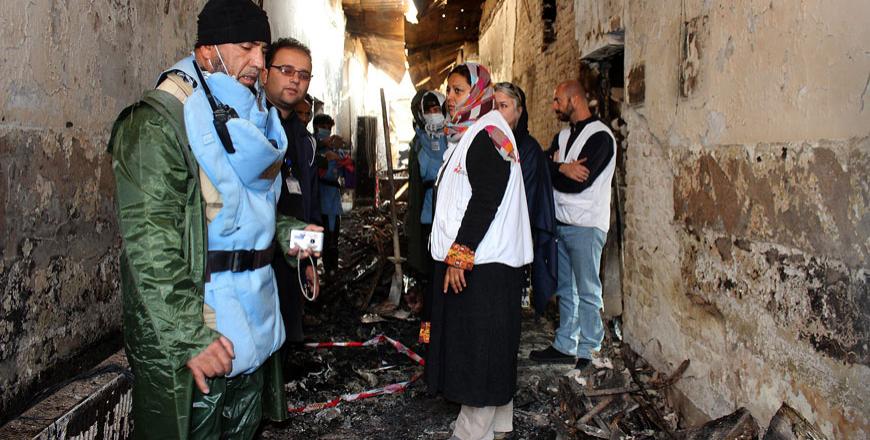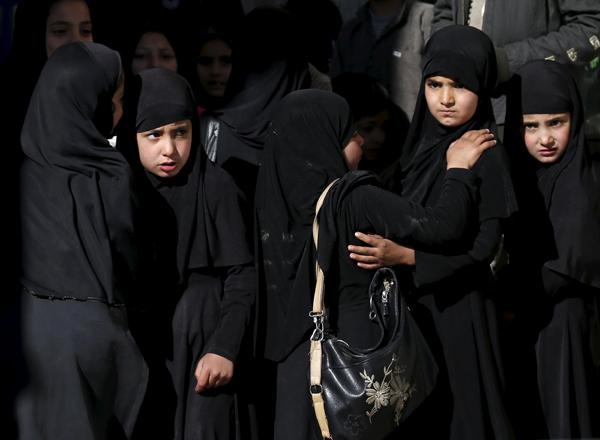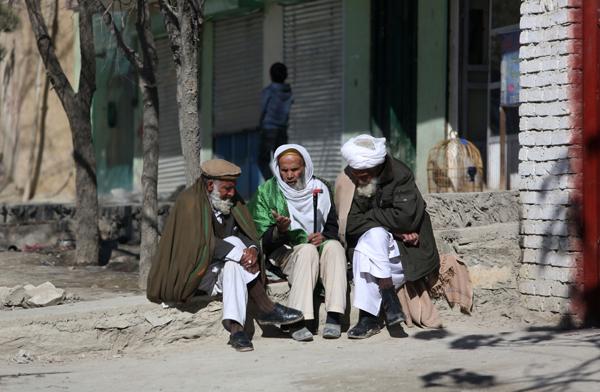You are here
MSF hospital strike was ‘human error’ — US general
By AFP - Nov 25,2015 - Last updated at Nov 25,2015

In this photo taken on November 10, an Afghan worker talks to staff members in a charred corridor of the damaged Médecins Sans Frontières Hospital in northern Kunduz (AFP photo)
KABUL — A deadly air strike on a Doctors Without Borders (MSF) hospital was "caused primarily by human error", the US commander in Afghanistan said Wednesday, promising disciplinary action as he detailed a US investigation into the catastrophic attack.
The October 3 air raid on the French charity's hospital during a Taliban offensive in the northern city of Kunduz killed at least 30 people, sparked an avalanche of global condemnation and forced the facility to close.
The "tragic but avoidable accident [was] caused primarily by human error", General John Campbell told reporters at NATO headquarters in Kabul, adding those most closely associated with the incident had been suspended from their duties.
He blamed in part fatigue of US troops who had been battling a Taliban offensive in Kunduz for five days, adding that the mistake was "compounded by process and equipment failures".
The Special Operations AC-130 gunship aircraft hit the hospital instead of a nearby Afghan intelligence compound that was thought to have been commandeered by Taliban fighters during their brief capture of the northern provincial capital, he said.
"The medical facility was misidentified as a target by US personnel who believed they were striking a different building several hundred metres away where there were reports of combatants," Campbell said.
Those who requested and executed the strike "did not undertake appropriate measures to verify that the facility was a legitimate military target", he said.
Some of those involved in the attacks failed to follow the rules of engagement, Brigadier General Wilson Shoffner said at the same news conference.
MSF has called for an independent international investigation, saying the attack could be determined to be a "war crime".
Despite repeated questioning on the matter, Shoffner refused to say if there would be an additional international independent investigation.
"We believe the investigation completed was full and impartial, and we stand by the findings and recommendations, and we support the process by which it was conducted," he said.
29 minutes
The strike began at 2:08am local time, Campbell said, and at 2:20am MSF phoned the US military to report they were under attack.
"It took the headquarters and the US special operations commander until 2:37am to realise the fatal mistake. At that time, the AC-130 had already ceased firing. The strike lasted for approximately 29 minutes," he added.
Electronic systems on board the gunship had malfunctioned, he said, cutting off much of its communications, and the aircraft had diverted from its path believing it had been targeted by a missile, degrading the accuracy of "certain target systems".
This meant that when the crew entered the coordinates they were directed to an open field some 300 metres from the intended target. "The investigating officer found that the air crew visually located the closest, largest building near the open field which we now know was the MSF trauma centre," Campbell said.
The hospital appeared similar to the description provided of the intended target, and at night the crew was "unable to identify any signs of the hospital's protected status".
"We have learned from this terrible incident," said Campbell.
"We will also take administrative and disciplinary action through a process that is fair and thorough [and] considers the available evidence."
Afghan President Ashraf Ghani welcomed the results of the investigation in a statement, saying the strike was a "painful demonstration of the cost of war".
Contrasting accounts
The timeline given by Campbell in parts differed from MSF's own account of the attack, which the charity has said lasted for around an hour.
In an internal review released earlier this month, MSF detailed frantic efforts by its staff to reach US and NATO officials to halt the strike.
According to that report, by 2.37am when Campbell said US officials had realised the mistake, four phone calls had been made by MSF representatives in Kabul and New York to NATO, the Red Cross, a UN military liaison, and the US defence department.
The calls continued after Campbell said the gunship had stopped firing, with one message at 2.56am "insisting that the airstrikes stop and informing that we suspected heavy casualties", according to the MSF account.
In the initial days after the attack the US military offered a series of shifting explanations before President Barack Obama admitted in a call to MSF chief Joanne Liu that it had been a mistake and apologised.
A NATO statement released hours after the attack did not confirm the hospital was targeted, characterising it instead as "collateral damage" as Afghan forces came under fire.
The next day the US confirmed the hospital was hit directly but did not offer further details.
Later General Campbell suggested that Afghan forces had called in the strike, before offering a fourth account in four days admitting US special forces had been in touch with the aircraft.
NATO and the Afghan army are conducting their own investigations.
On Tuesday, MSF released short biographies of 14 staff members who died in the attack, including doctors, nurses, cleaners and guards. They were described as dedicated to their work and their country.
Related Articles
KABUL — A Taliban suicide bomber blew himself after joining a queue to enter a police office in Kabul on Monday, killing 20 people and wound
KABUL — Coalition aircraft struck Daesh’s new radio station in the eastern Afghan province of Nangarhar late on Monday, part of NATO's escal
NATO formally ended its war in Afghanistan on Sunday, holding a low-key ceremony in Kabul after 13 years of conflict that have left the country in the grip of worsening insurgent violence.



















